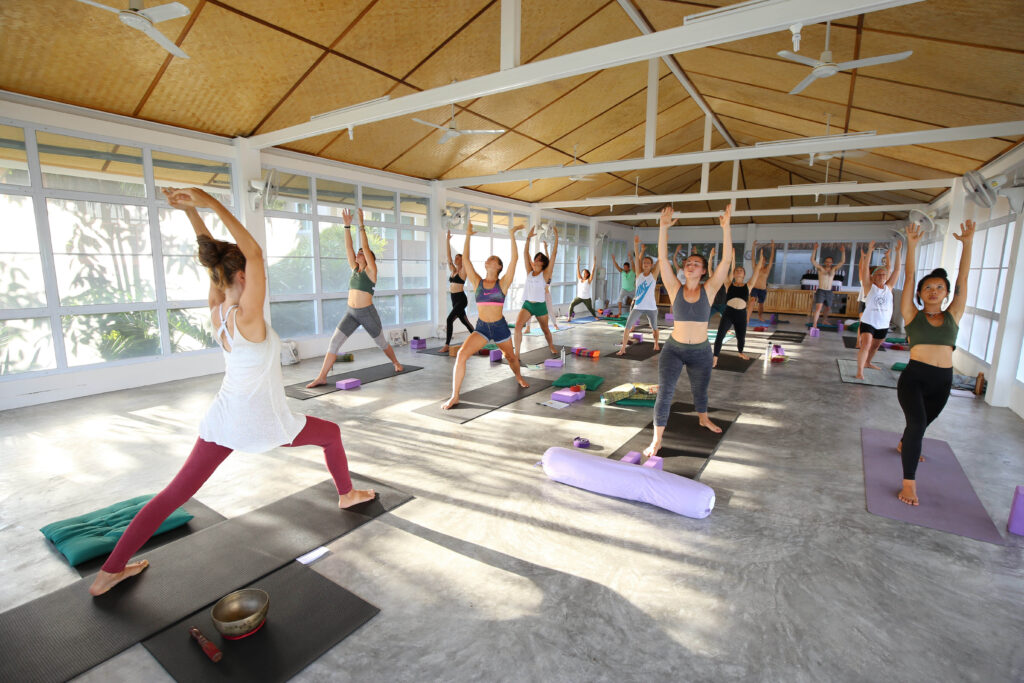500 Hour Yoga Teacher Training
May 5 - July 13, 2024
Our 500 Hour Yoga Teacher Training program is a 10-week, intensive course that combines our 200-hour and 300-hour trainings. In line with our holistic approach to yoga, this training offers a detailed exploration of yoga asanas, anatomy, philosophy, meditation, and pranayama, with a strong emphasis on teaching methodologies.
Alongside other practices, throughout the training, we will be dedicating increasing amounts of time to meditation, on the most important pillars of traditional yoga, as described in the Yoga Sutras of Patanjali.
Our curriculum exceeds Yoga Alliance standards, allowing you to register as an RYT 500 teacher upon completion. This top-tier certification gives a significant edge in global yoga career opportunities compared to the 200-hour and 300-hour certificates.
We provide an opportunity for newly-certified teachers to continue practical training by offering free classes to the local community. This practice helps grow confidence, hone teaching skills, and learn how to address specific student needs, with experienced teachers available for support.
Our instructors have years of experience in yoga and meditation and are dedicated to sharing their skills. We foster a ‘sangha’ or spiritual fellowship, providing a nurturing learning and sharing environment.
DAILY SCHEDULE
06:20 – 07:00 Meditation
07:00 – 08:30 Yoga Practice
08:30 – 10:00 Breakfast
10:00 – 11:30 Art of Teaching
11:30 – 12:00 Tea Break
12:00 – 13:30 Anatomy and Physiology / Meditation
13:30 – 16:00 Lunch Break
16:00 – 17:30 Philosophy
17:30 – 19:00 Dinner Break
19:00 – 19:40 Meditation
Sundays are your day off!
CURRICULUM
PART 1 – YOGA TECHNIQUES, TRAINING, AND PRACTICE
- Asanas – the classical yoga poses along with their physical, energetic, and healing effects. Modern additions and variations from intermediate to advanced are included.
- Pranayama – traditional yogic breathing techniques will be practiced on a daily basis.
- Mudra – important yogic “gestures” will be studied and practiced.
- Bandha – “energetic locks” will be applied, combined with asana and pranayama.
- Kriya – classical purification techniques will be explained and practiced.
- Meditation – five classical techniques will be introduced and practiced daily.
PART 2 – TEACHING METHODOLOGY
- Demonstrating, adjusting, and assisting students.
- Teaching styles, qualities of a teacher, and the student’s process of learning.
- Class sequencing and class layout.
- Preparation points for building a yoga class.
- Meeting the needs of students.
- 4 tools of teaching.
- Principles of teaching different asanas; standing, balancing, seated, core, backbends, restorative/ cool down poses, etc.
- Advice for teaching based on Karma Yoga.
- Combining asana and pranayama for more powerful classes.
- Teaching various kinds of meditation, from modern mindfulness practices to the classical techniques outlined in the Yoga Sutras.
- Teaching the philosophy of yoga to beginners.
- Weaving yogic philosophy into your classes.
- Accessible yoga – teaching targeted classes (such as yoga to regulate the nervous system) and specific populations, injuries, prenatal and postnatal.
- Trauma awareness – holding space, safe vocabulary, and asana awareness.
- The business of yoga and principles of online teaching.
PART 3 – YOGA ANATOMY AND PHYSIOLOGY
- Subtle Anatomy (Chakras, Nadis, Energy bodies & Kundalini).
- Physical Anatomy (Human skeleton, Joint-segments with movement and functions, Muscle tissue and Fascia theory).
- Functional Anatomy (Main Muscle groups and their functions, Skeletal variations and the influence on Yoga Asana performance, Spinal health, and most common injuries).
- Human Physiology (The major body systems and organs, special focus on the Respiratory system and the Nervous system).
PART 4 – YOGA PHILOSOPHY, LIFESTYLE, AND ETHICS
- What is Yoga?
- The purpose of Yoga.
- Deep look into the Yoga Sutras of Patanjali and key verses including Dharana, Bhavana, and Ishwara Pranidhana.
- Looking at each sutra in detail, translating it, then practicing with it (sadhana), and understanding how to embody it into our life.
- The 8 limbs of Yoga.
- History of Yoga.
- Sat Karma Kriyas (Purification techniques).
- The Gunas and Ayurveda. Understanding the play of the Gunas and how to increase Sattva (balance).
- Going beyond the Gunas.
- Tantra.
- Meditating on the verses of the Vijnana Bhairava Tantra and how each one can be a way to live life with a greater depth of awareness.
- Supernatural powers and liberation.
- The Bhagavad Gita.
- Buddhism & Yoga including essential teaching: Anatta, 4 noble truths, 8 fold path.
- How to include yogic philosophy in our day-to-day living and develop trust in the way life works.
PART 5 – PRACTICUM
- Practicing teaching.
- Receiving feedback.
- Observing others teaching and listening/giving feedback.
- To assess your teaching skills and understanding of the course content, you will pass 3 practicums – in week 4, 7, and 10. Each practicum consists of a 60-minute guided yoga class. In addition, you will assist your fellow students as an adjuster.
- In week 4 and 10, you will also need to take written exams in order to successfully complete the course.
- Optional extended practicum after graduation.
Category : 500-hour TTC

